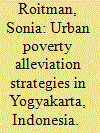| Srl | Item |
| 1 |
ID:
139767


|
|
|
|
|
| Summary/Abstract |
Critics of human rights are hesitant to reject them outright for fear of undermining the work they may do in resisting oppression. This pragmatic justification is central to celebrations of human rights as well, but is it more than a failure to move beyond liberal hegemony? I argue that human rights have radical potential because the act of claiming such rights uses the ambiguous but universal identity of ‘humanity’ to make claims on the established terms of legitimate authority. The potential of human rights to fight for social change is examined by looking at the movement for a human right to housing in the USA. I explore how homeless individuals, public housing tenants and low-income urban residents realise their human right to housing through eviction defences, the occupation of ‘people-less’ homes, and attempts to remake the structure of home ownership through community land trusts.
|
|
|
|
|
|
|
|
|
|
|
|
|
|
|
|
| 2 |
ID:
129475


|
|
|
|
|
| Publication |
2013.
|
| Summary/Abstract |
Community development in the border areas of Indonesia have not received sufficient government attention, despite being a strategic area and a reflection of a country's front line. The focus of this article is the National Community Empowerment Program in the rural border area of West Borneo Previous studies have indicated various impacts to the border area welfare, such as the rise of unemployment within communities, difficulty in gaining access to food sources, increase in the consumptive nature of the people, heightening of criminal cases, decrease of the quality of environment, and the rising presence of patrons and clients. If this issue is left unresolved, the community will surely face increasingly complex conditions.
|
|
|
|
|
|
|
|
|
|
|
|
|
|
|
|
| 3 |
ID:
169145


|
|
|
|
|
| Summary/Abstract |
A multidimensional understanding of poverty includes the access of poor groups to decision‐making processes based on their needs and aspirations. However, the realisation of this ‘right to make decisions’ faces multiple obstacles. Over the last 20 years in Indonesia, in a context of a more democratic political environment and policy decentralisation, poverty alleviation policies have followed institutional arrangements to provide communities with opportunities for greater participation in development projects. Poverty data show a clear improvement in the living conditions of urban poor citizens in Indonesia; however, it is unclear whether poor communities have become stronger and more independent from public grants and better able to make their own decisions. This research analysed two urban poor communities in Yogyakarta, Indonesia, and found that some communities working on participatory poverty alleviation strategies still face obstacles to becoming more independent and making their own decisions because they remain part of an historical legacy of top‐down approaches to poverty, highly dependent on government support and working only within ‘invited spaces’. Conversely, those communities with more limited access to government funding have been more innovative in their strategies and have created ‘invented spaces’ for collective action that allows them to be more independent and empowered.
|
|
|
|
|
|
|
|
|
|
|
|
|
|
|
|